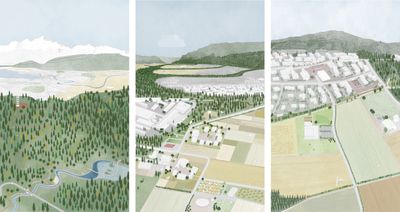Zone FrancheJardins MétropolitainsCharlotte Schaeben

The popular branding of the city of Geneva as a City of Peace refers, along with its idyllic geographical location, above all to its historically grown internationality. While the city enjoys worldwide recognition, the peculiarity of its French hinterland is lost in the pejorative description as dormitory suburbia. In recent urban research projects, the Pays de Gex figures either nondescript between the definition of “Metropolitan Region” and “Quiet Zone,” or as part of the peripheral French border zone “Autre Genève.” Neither description addresses the particularity of the territory and its fundamental importance for the metropolitan region known as Grand Genève. In order to balance the city’s hegemonic position and to promote a cross-border perspective of different, but equivalent territories, the aim of this analysis is therefore to establish a refined perception of the Pays de Gex.
Declared a Zone Franche (Engl. Free Economic Zone) in 1815 in order to guarantee the city’s supply of agricultural products, the former rural region has faced tremendous growth, quadrupling in terms of number of inhabitants within the last four decades. In contrast to Geneva, which develops according to a cantonal structural plan, the Pays de Gex shows isolated municipal urbanisation projects without overall planning. How can a contemporary reading of the Pays de Gex as part of Geneva be established?